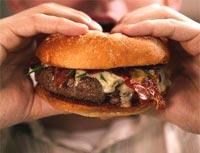 esolutions are meant to be broken, they say.
esolutions are meant to be broken, they say.
But not if it concerns your health, say doctors. 
Most resolutions are made on New Year's Eve and are broken the first morning of the New Year because making minor changes in our lifestyle is difficult for most people.
Here are some of the reasons why health resolutions fail.
Unrealistic expectations
i. Lose weight and eat less junk food top many lists of New Year's resolutions.
But sticking with those good intentions is not that easy. "Most people have unrealistic expectations. They decide this is the year they are going to change everything about their diet. That is just too hard to do," says Cybthia Sass, a nutritionist from University of Florida, in an online report.
"Willpower is not the issue. That would mean depriving yourself. And nobody gets excited about that. Focus on the positives -- you feel better, have more energy when you eat healthy," says Sass.
~ The solutions:
a. "While making dietary changes, start small," says Sass, adding "set a few realistic goals. In the long run, you will have better self esteem and more self confidence because you will actually stick with them."
"In India, the resolutions are most common among obese people. 'I will reduce 20 kilogrammes, exercise daily, eat less food and stop drinking,' are the most common resolutions," says Dr P K Chowbey, an obesity management expert at Sir Ganga Ram Hospital, New Delhi.
"But almost all of them fail," he explains, "as these are unrealistic goals."
b. Dr Chowbey says: "The goal should be to reduce five kilogrammes a year: eat one chapatti less; exercise on weekends; reduce the intake of alcohol. Those who set high goals are always poor starters and can never maintain their goals, as most obese people have a weakness for food and alcohol. They are also lazy."
ii. I will quit smoking is another most widely made resolution by Indians, says Dr Sajeela Maini, a tobacco cessation expert. "Resolutions to quit smoking are generally made on birthdays, anniversaries or on New Year, but in almost all cases, when undertaken without a doctor's supervision, they are delayed."
~ The solution:
The success rate can be as high as 80 per cent if you enroll in a structured programme, says Dr Maini.
Stick to your resolutions
WebMD, a medical web site, outlines 11 ways to keep your 'eat better' resolution, that includes:
- Don't skip breakfast.
- Don't skip any meals or snacks.
- Make sure you have 30 minutes of activity every day.
- Cut down on sodas and sweetened drinks. Drink water instead.
- Have five servings of fruits and vegetables every day.
- Munch on fruits and vegetables when you are hungry.
- Frozen vegetables are a good option to snack when lightly seasoned with herbs, lemon juice or vinegar.
- Make sure you carry fruits and vegetables or very light snacks like a couple of Marie biscuits.
- When you are making a salad, sprinkle oats or wholegrain cereal for added fibre so you feel full.
- If you make pasta, fill it up with vegetables and protein (like tiny shrimp for those who eat meat, or soya nuggets for those who are vegetarian).
- Select a variety of fruits, rather than stocking up on a large quantity of the same fruit.
Remember: start small and in steps, says Dr Chowbey.
DON'T MISS!








More from rediff